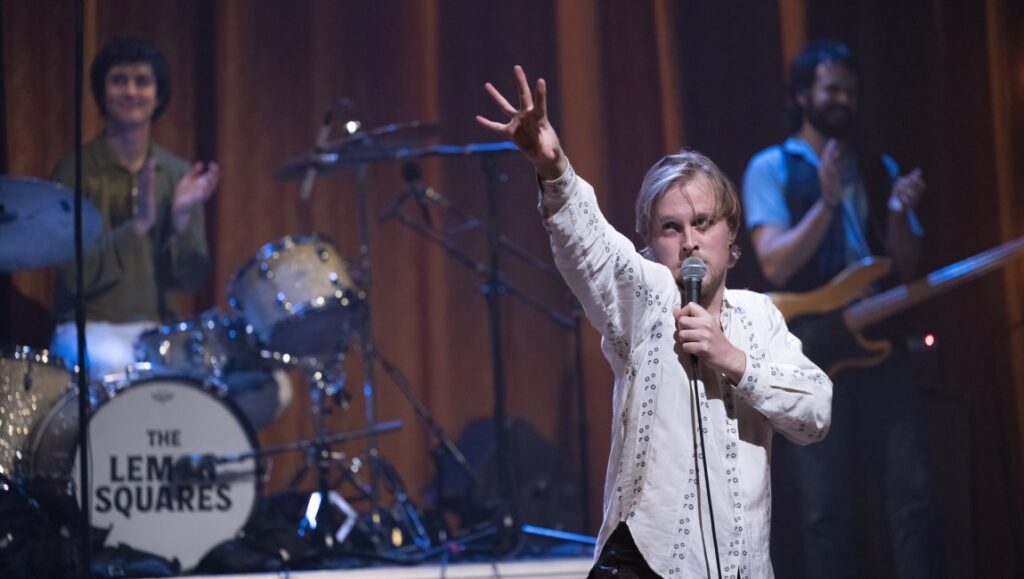The motley lineups of the Tribeca Film Festival often may not deliver the riches of more prestigious festivals, but they do provide space to expand the notion of a film festival. Tribeca often gets more press for its events (some featuring co-founder Robert De Niro and his collaborators) than for its film premieres. This year’s Spotlight Narrative section, though, does offer a screen-specific curiosity in the form of John Early: Now More Than Ever (directed by Emily Allan and Leah Hennessy), an HBO comedy special. Early’s work, including in collaboration with Kate Berlant, has often spanned various media, and there are plenty of bells and whistles in Now More Than Ever, but the film — Tribeca’s program refers to it as a feature, so “film” seems like viable shorthand — largely hews to the outline of a standup special. Though Early is backed by a band who performs several cover songs with him and appears in fictionalized backstage footage, a majority of the runtime is devoted to him onstage, telling jokes.
It’s fortunate, then, that Early is an exceptional stand up comedian. His first joke compares the infamous Donald Trump Access Hollywood tape to his own locker room talk as a closeted gay teenager. Making fun of Trump risks being labeled as hack work, and while it may not be Early’s best bit, it’s both effective and indicative of his style. He certainly isn’t afraid of political or social commentary, both of which run through the special, but they take a backseat to joke construction. Yes, belittling Donald Trump is an easy way to get a Brooklyn (or Tribeca, or HBO) audience on your side, but the bit is less about saying anything about Trump than it is about Early’s recontextualized delivery of Trump’s lecherous comments. Even more effective than Early’s delivery is his physicality, showcased in the following joke: Taking the phrase “be yourself” as his target, he points out the ironic uniformity with which the cliche is deployed. The punchline, though, isn’t an excavation of deep truth, it’s Early striking a ridiculous pose that he claims is “what they want” when they tell you to be yourself. Certainly there is a banality to the cliché that Early is highlighting, but the bit isn’t funny because he’s excavating a great truth; it’s funny because he looks silly.
It’s somewhat perplexing, though, that Now More Than Ever implements two separate deviations from the standup form when Early functions so creatively within its space. The backstage bits are the less successful of the two. At their best, they feel close to actual backstage footage beset with the occasional absurd flourish, but as they progress, they begin to feel more often like half-conceived sketches. The character Early plays, an inane and oblivious boss without boundaries, seems incongruous with his standup persona, which demonstrates the self-awareness to admit that he’s one of the vapid Millennials he’s making fun of. By the time these bits coalesce into a plot, they feel both perfunctory and disarmingly unpleasant. If the segments serve to disentangle Early from this character he plays, then his musical performances might, on the surface, do the opposite. Music is still a performance, but it’s often one more vulnerable and genuine than comedy, possibly serving to narrow the divide between man and artist. But while Early doesn’t seem to treat any of the pop songs he sings with ironic detachment, he does play with notions of sincerity in his performance. He’s still playing a character, but the diva showboating beyond his vocal ability is more in line with his comedic persona than the character he plays in the backstage bits. And, though he doesn’t drop the persona entirely, the vulnerability inherent to singing on a stage still comes through.
The cinematic construction of the special is more conventional than Early’s comedy, but the film form does at least follow the latter’s direction. Early often plays with perspective, telling jokes that feel personal in the second person, and utilizing fluid shot lengths and angles helps enhance this off-kilter effect without ever being distracting. There’s also a clear intention to the deployment of audience shots, which aren’t as sparse as in Stop Making Sense — to take a filmed performance that has largely been accepted within film canon — but are used only when Early’s interaction with the audience is important to the project’s incident. So while neither the scripted bits nor the musical performances take the film beyond the form of the standup special in a way that would justify its inclusion in a film festival, perhaps it’s more interesting, anyway, to make the argument that no such limitation of form need be imposed at all.
Published as part of InRO Weekly — Volume 1, Issue 24
Enjoy our content? Want early access to features, interviews, and more? Support us on Patreon!


Comments are closed.